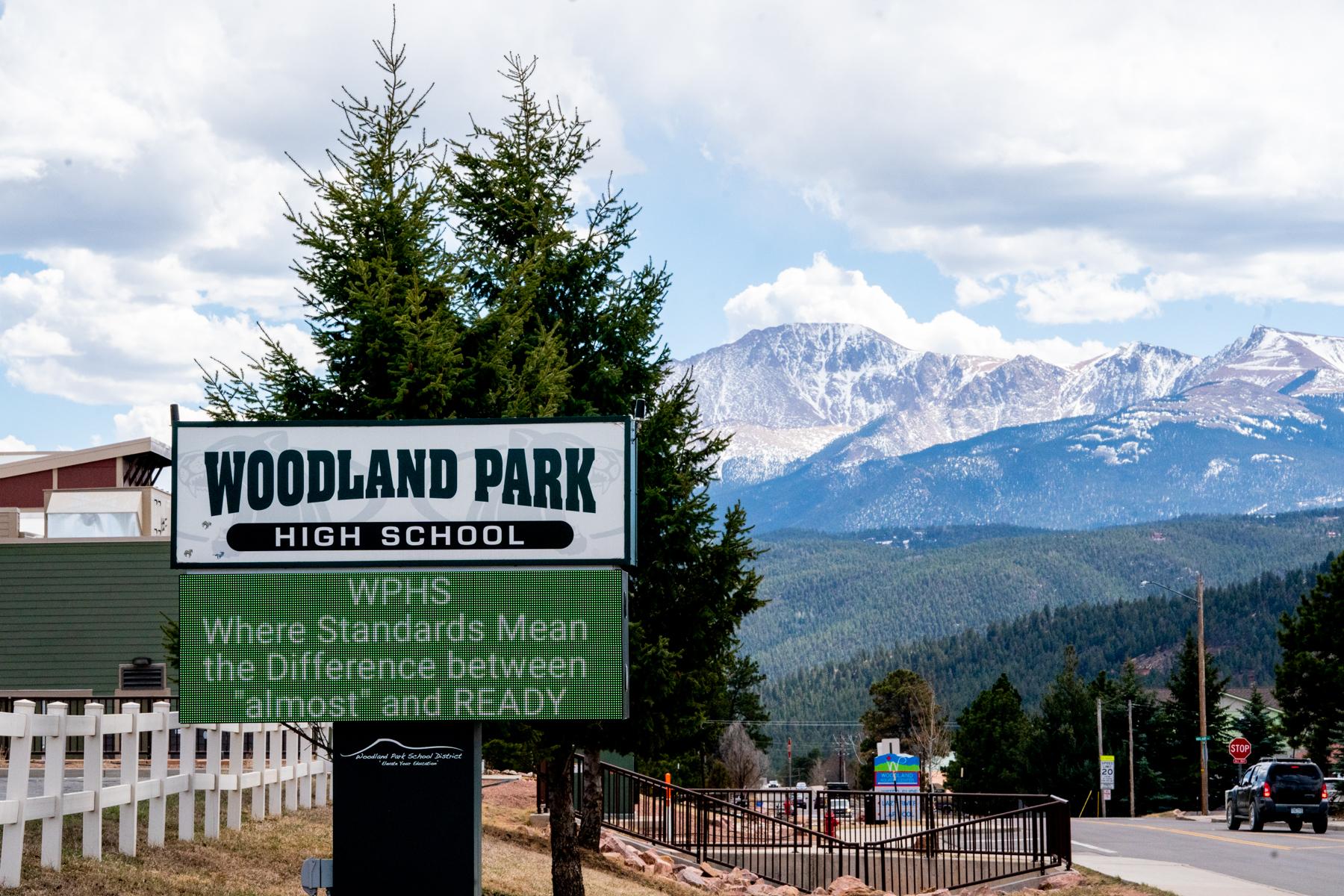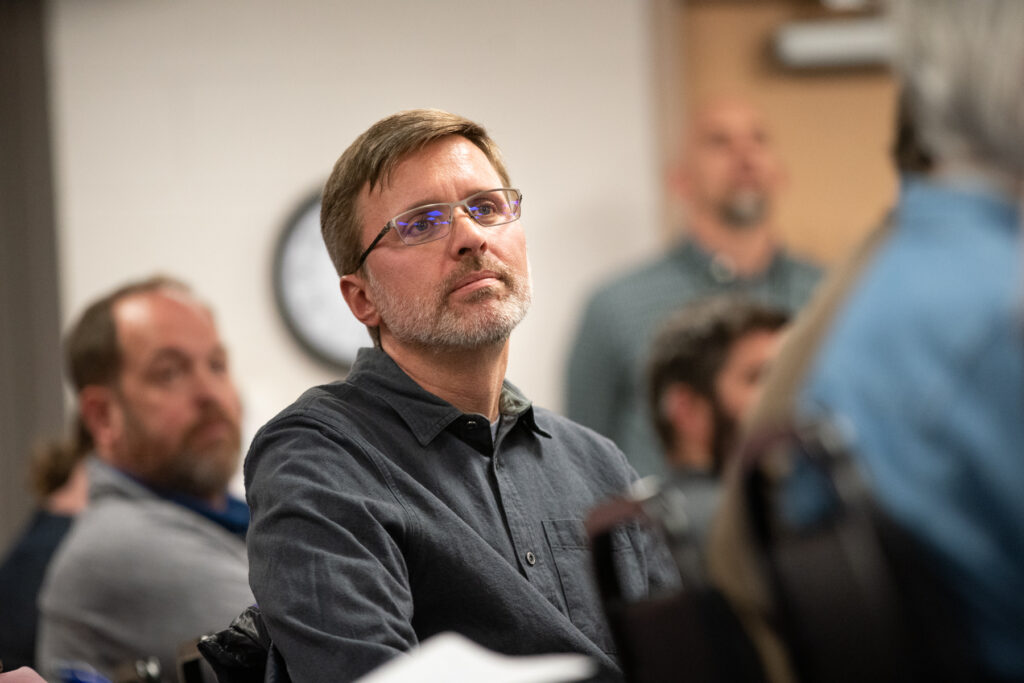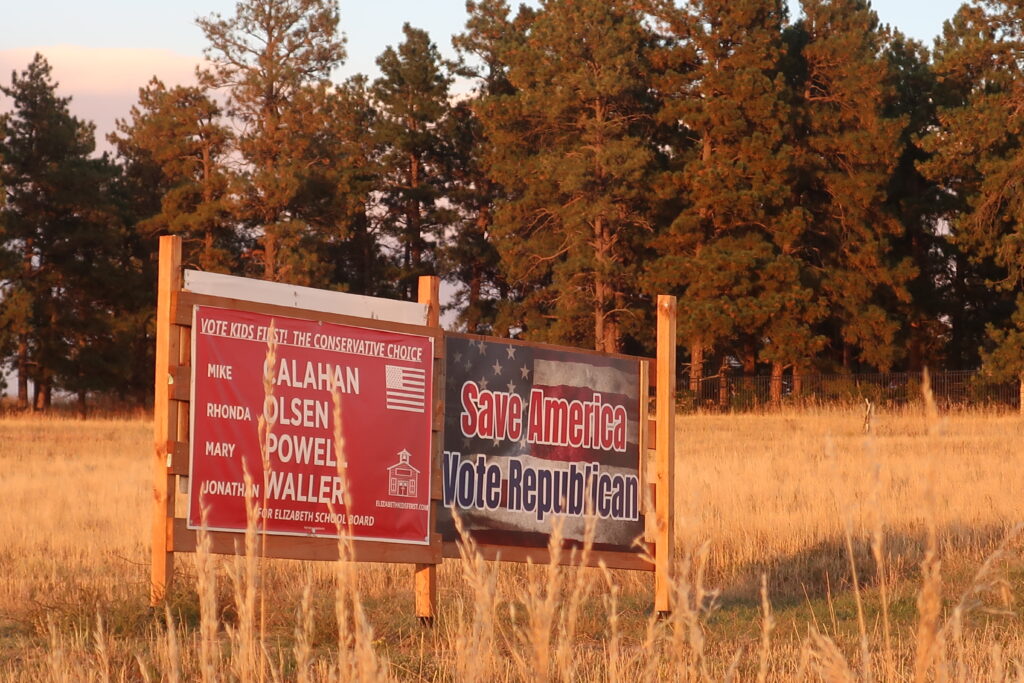
Traditionally, school board races are nonpartisan and political parties steer clear. Many Colorado school districts races this year are still focused on traditional public school issues like academic achievement gaps and budgets. But in more districts than ever, efforts to restrict lessons on race, racism and LGBTQ issues, as well as anti-LGBTQ rhetoric and religious declarations have dominated school board race forums.
We took a close look at the takeover of the Elizabeth school board by people trying to fight national culture wars in their backyards. Other districts where conservative boards gained power in 2021 are trying to maintain their hold, while several district boards are facing challenges from candidates who are vocal about culture issues.
In some districts, churches are taking a keen interest in school board elections. A group called Transform Colorado that aims to restore biblical values in the public square, has distributed what it calls a “nonpartisan” voter guide in churches across Colorado that highlights candidate positions to “help citizens make informed decisions as they seek to vote according to biblical values.”
Individual flyers for 30 school districts are paid for by the Truth & Liberty Coalition, the Woodland Park-based nonprofit, which has called for Christians to reclaim the “Seven Mountains” of societal influence — one of them being education. Its website states: “We seek to restore biblical truth and Godly morality into our country’s failing educational system.”
The flyers include candidate positions on teachers using a student’s preferred gender pronoun, transgender students participating in sports, parent notification for mental and physical health treatment, and whether they believe the U.S. is systemically and fundamentally racist.
The coalition paid for the candidate-position flyers, to be distributed in churches and candidate forums, in districts where some candidates hold positions likely to be embraced by the Coalition’s worldview: Academy 20, Adams 12, Archuleta County, Brighton 27J, Buena Vista, Cañon City, Cherry Creek, Cheyenne Mountain, Colorado Springs, Delta County, Douglas County, Estes Park, Falcon District 49, Fountain District 8, Fremont, Garfield, Greely, Harrison, Jefferson County, Lewis-Palmer, Littleton, Mesa County Valley, Poudre, Pueblo 60, Pueblo County, Thompson, Weld RE-8, Widefield, Windsor, and Woodland Park.
Here’s a look at the school board races in some of those districts:
Woodland Park

Turmoil in Woodland Park northwest of Colorado Springs made national news after a new board swept into office in 2021 adopted conservative American Birthright social studies standards after the state rejected them, eliminated 15 mental health and counselor positions, and enacted a policy banning teachers from speaking to the media or posting on social media about district matters without prior approval. About 35 percent of teachers and staff left the district at the end of the last school year.
While the district says many residents back the board’s changes, other community members have mounted a fierce opposition to what they see as a dismantling of the district, including shining a spotlight on every district move.
Three of the five Woodland Park seats are up for election. Three challengers, Seth Bryant, Mike Knott and Keegan Barkley vow to return to “traditional, common sense school leadership,” ridding the district of “political agendas” and restoring fiscal responsibility and mental health supports, increasing academic opportunities, and transparency. Incumbents Cassie Kimbrell, Mick Bates and Dave Illingworth are running again to maintain control of the school board’s new direction, focusing on “parents rights,” protecting kids from indoctrination, and academic achievement.
El Paso County
Several districts in El Paso County face elections. D-11 in Colorado Springs has four of seven seats up. The past couple of years have been tumultuous, spelling the end of a district equity policy, the departure of the superintendent and turbulent board meetings about issues such as whether to recognize pronouns. The district saw more schools improve enough to get off the state’s watch list, but dropped in overall achievement compared to other districts.
In Academy District 20, alongside his advocacy for academic achievement with measurable goals, Derrick Wilburn has taken “a strong position against the ‘woke’ ideology infiltrating our schools” and against the inclusion of CRT in school curriculum. Co-founder of the parent’s rights group Advocates for D20, Wilburn is aggressively courting evangelical and LDS churches in the district for support, according to transcripts of the parent group’s Discord channel obtained by the Colorado Times Recorder. “We have GOT TO light a fire in the d20 churches,” Wilburn writes.
Amy Shandy, an advocate for special-education students, says “woke agendas are distracting from the core focus of student outcomes. On her website she reminds people that “your child does not belong to the government.” Both candidate said in a forum they support learning “the good, the bad, and the ugly” about American history.
In Pueblo 60, four out of five school district seats are up for election and a relatively new network of churches “Forging the Future” is backing what one pastor calls four “biblically minded, strong Christian” candidates. The organization has a campaign finance committee for donations to school board and city council candidates. The organization's registered filing agent is Quin Friberg, a pastor at the Family Worship Center in Pueblo. The organization’s website says it stands for parental rights, district transparency and calls for “God, Family and Country” to be respected in school.
On the Sept. 19 episode of the Truth and Liberty Coalition live call-in show, Richard Harris, executive director of the Woodland Park-based Truth and Liberty Coalition, interviewed Friberg, who said churches are involved in identifying and recruiting candidates to run for school board and municipal offices, including shooting videos of candidates, which he called “neutral” because there is no message stating to vote for that candidate.
Federal political campaign regulations prohibit nonprofit charities and churches from “participating or intervening in, (including the publishing or distributing of statements), any political campaign on behalf of (or in opposition to) any candidate for public office."
“These candidates all have a biblical worldview, solid Christians, they’ll make videos about why Christians should be involved, ‘we need to get out there, we can change our community,’ so just the name recognition, having those videos played in churches and them getting to see the name and the individual and their heart for the community and Christ….even if we don’t ‘say candidate for’ in the videos still does a whole lot,” said Friberg.
Friberg said churches are working behind the scenes, recruiting canvassers and recruiting people to put up signs in their yards. When asked by Harris if the churches directly support candidates, Freiberg said some of them do, it's “up to the church’s discretion.”
Though the pastor said almost all the efforts are on “how can we flip a school board, how can we change the leadership….get different administrative leaders to where they’ll be more friendly to us bringing in these (religious) programs.” At the same time Friberg told Harris: “We’d be far better off without public education, I’ll just leave it right there.”
Friberg said his church recruited a school board candidate for the Pueblo County District 70 last election and supported three of the four who won.

Douglas County School District was thrown into turmoil in 2021 after a new board majority was elected. A judge ruled the decision to fire Superintendent Corey Wise was made illegally, Wise’s lawsuit cost the district more than $800,000, and divisions in the community deepened over efforts to change the district’s equity policy.
Three seats are up this election. Candidates Jason Page, Andy Jones and Maria Sumnicht have the same campaign manager as the members of the board majority in 2021, and opponents fear if they’re elected, there won’t be any checks and balances on the board. Running on another slate - Community Voice, Community Choice - are Brad Geiger, incumbent Susan Meek and Valerie Thompson. They say their focus is on safe and welcoming schools, attracting and retaining staff, and rebuilding community trust.
Cañon City
In Cañon City, there are three open spots on the school board in the small district where more than half the children live in poverty. Three who describe themselves as “conservative patriotic people” are running affiliated with the “We The Parents” organization. Matt Alexander, a longtime community volunteer who runs his own business, told the Fremont County Crusader he “watched the Leftists begin to take ground” and referred to teachers “indoctrinating our children with low level ideology.” He also said parents don’t know what is going on in schools and erroneously stated that there are no standards upon which the education system is founded.
At a recent campaign forum however, he confirmed that he is “not a white supremacist-LGBTQ hating-Christian that is set to indoctrinate children.” He is co-president of the Cañon City High School Band Boosters and said he has no plans if elected to fire the superintendent and said there is no hidden conservative agenda. He did say he would consider adding armed staff or increased police staff in schools.
Graceann Pitner is a former teacher and wants to reduce burdens on teachers and giving classroom aides a living wage, but she also calls for cameras in the classroom and giving parents the right to approve curriculum and textbooks.
Incumbents, meanwhile, like board president Robin Reeser, a former accountant, real estate agent and “fiscal conservative,” are running on more traditional issues such as student-centered education, continuing to secure grants to improve the condition of facilities, improving staff compensation, and ensuring all graduates complete a capstone/intern/apprentice experience. Bret Meuli is a retired teacher and administrator who wants to continue to meet the needs of students and building school-to-workforce skills. Janelle Valladares, a fisheries biologist, is running on fiscal accountability, student’s safety and well-being and transparent and accountable leadership.
“We have come so far in the last decade,” said Reeser, citing millions of dollars in grant money she helped raise for buildings, expanded career pathways for kids, and a new housing initiative to attract teachers.
“The three of us want to keep expanding on the great things that are happening here, and they’re (We the Parents slate) going to tear it apart,” she said. “To me that’s what’s at stake.”
Weld County
In 2021, Weld County school districts saw a surge of residents wanting to overthrow traditional school board members. At that time, mask-wearing galvanized many parents. This year, the county’s smaller districts have fewer contested elections and the mood seems quieter. It will be important for voters to listen to debates because reading candidates bios, it’s difficult to assess where they stand on issues, though some use phrases like “the preservation of traditional American family values” to signal their areas of interest.
In the Greeley-Evans 6 district however, seven candidates are running to fill three seats. Two of the candidates have been active in trying to get books banned, and their registered agent is an officer with Greeley Republican Women. It’s difficult to assess how widespread their support is, as some media reports show it is a small, vocal minority that supports such bans. A Greeley Tribune analysis found that the number of people filing complaints about books in Greeley-Evans schools was less than 1 percent of voters who participated in the last election on a school-related issue, and most had no children in the schools.
Jefferson County, Denver County, Boulder County and others
Meanwhile, in many of the major school districts — Jefferson County, Denver, and Boulder Valley — candidate debate centers on traditional issues such as the best way to close academic gaps, budget shortages, declining enrollment and school safety. And in still other districts like Durango, St. Vrain Valley or some smaller districts, elections were canceled because no challengers stepped forward.









